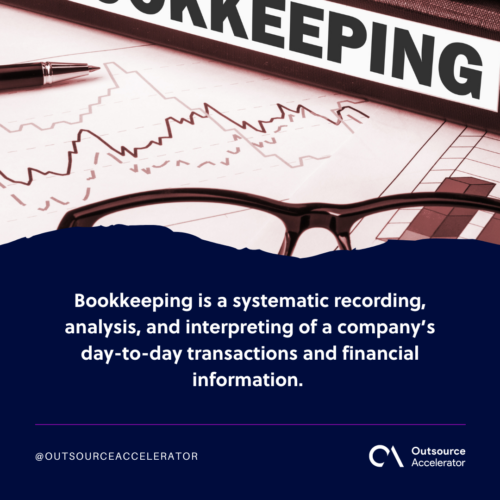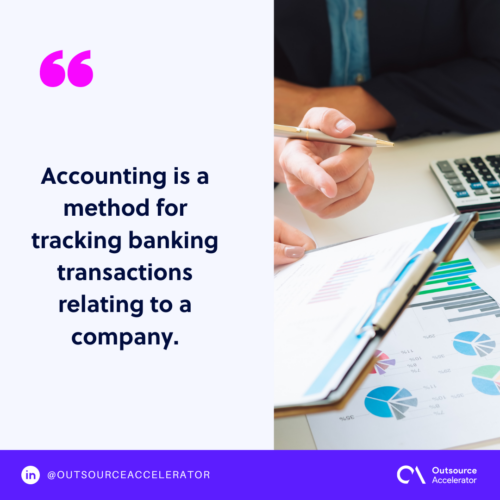Bookkeeping vs Accounting: What’s the difference?

Virtual bookkeeping and accounting services are currently in demand for small businesses. However, regular people tend to get confused between bookkeeping vs accounting.
Bookkeeping and accounting provided immense contributions to business analysis. These financial statements should be regularly generated and used for analysis so you can track your cash inflows and outflows. Since it is expensive for small companies to hire a full-time accountant, delegating online bookkeeping and accounting services can truly help.
What is bookkeeping?
Bookkeeping is a systematic recording, analysis, and interpreting of a company’s day-to-day transactions and financial information. The most crucial part of bookkeeping is maintaining the accuracy of the process to provide credible information. Every transaction must have a record, whether it is an inquiry, purchase, or sale.
Bookkeeping also presents the former financial performance of your company. This data can be the foundation of your plan. The past bookkeeping data will give you a clear picture of what completely works or doesn’t work.
Many small business services firms can offer a diverse range of outsourced services to larger companies. If your company is at the fast pace of growth, outsourced bookkeeping services can help keep up with that progress.

What is accounting?
Accounting, meanwhile, is a method for tracking banking transactions relating to a company. The accounting process involves summarizing, reviewing, and documenting these transactions to supervisory authorities, regulators, and customs officials.
The financial statements included in the accounting are precise summaries of financial activities during the accounting period. It summarizes the expenses of the company, its financial status, and its cash flows.
Accounting is one of the most important aspects of almost every company. It can be managed by a bookkeeper or an accountant in a small business. However, it can also be handled by large finance divisions with many staff in larger firms. Accounting is both a field of study and practice committed to the performance of the said activities.

Bookkeeping vs accounting: The main differences
Bookkeeping and accounting are comparable in several areas. While bookkeeping is a transactional and administrative function, accounting is more subjective.
While bookkeeping and accounting appear to be somewhat similar, there are some striking distinctions between them. Here are the main differences between bookkeeping and accounting:
| Bookkeeping | Accounting | |
| Definition | Bookkeeping is a record-keeping method to monitor your financial data. | Accounting is the method of gathering, analyzing account records and a report is prepared for the same. |
| Purpose | Bookkeeping aims to establish a record of financial transactions that can be summarized for a variety of purposes. | Accounting aims to collect and record financial statements about the performance, financial status, and cash flow of a company. |
| Management | Management does not take any financial action when reviewing the records of accounting. | After reviewing the overview report received by accounting, the management will settle on the financial decisions. |
| Required skills | The bookkeeper does not need to have any unique skill set to handle and monitor financial reports. | Accountants require special expertise to record, view and review financial details to file reports. |
| Financial statement | The financial statement is not compiled using the details received from bookkeeping. | Accountants compile the financial statement using accounting records. |
| Types | The two types of bookkeeping are single entry and double entry. | The two common types of accounting are cost accounting and managerial accounting. |
| Analysis | Bookkeeping does not necessarily require any analysis | Accounting uses the accounting record to interpret financial records to file reports. |
| Employee | Bookkeepers log the business’ day-to-day transactions and collect data. They have the same pattern in recording data every time. | Accountants can check the recorded reports on your financial transactions. They convert the details into claims, giving a full view of your finances. |
Where to outsource your bookkeeping vs accounting functions
Outsourcing doesn’t mean sending jobs offshore. Outsourcing simply means hiring a remote worker or independent contractor. Because of the evolving technology, many online services are becoming the new norm, escalating quickly. When you outsource your bookkeeping and accounting services, your company will save more money and time.
Offshore staffing
Offshore staffing is the service of supplying offshore staffing options for all categories of companies. From small and medium-sized firms to organizations. Any organization that partners with offshore staffing has a convenient and cost-effective option to operate a huge and costly office in its home country.
Offshore staffing is much cheaper than working for businesses in local markets or neighboring countries. This is because their economic condition helps them to set lower hourly wages, which is the primary reason why outsourcing has become a favorable choice.
However, working with a team from across the world in a different time zone makes contact even more challenging. Communication is the secret to high-quality, cost-effective, and time-efficient applications. The drastic difference in time zones can complicate any type of communication.
When choosing an offshore staffing provider, opt for established firms like Staff Domain to ensure accurate and excellent bookkeeping and accounting services.
Nearshoring
Nearshoring refers to the delegation of software development activities to an extended team in a neighboring region, typically in closely related time zones. Nearshore outsourcing operates much as offshore, except that the company is paired with employees in close time zones and geographic locations. It makes contact and physical site visits a lot easier. On-site appointments can take place more quickly and more often.
Nearshoring contributes to positive management and quicker contact, which saves an organization a lot of money. Another aspect that adds to its cost-effectiveness.
However, nearshore cannot compare with the hourly rates of offshore companies, but the flexibility of being in a similar time zone and providing faster travel times for on-site visits reduces not just the costs but also the pressure on you and your business and enhances the development process.
While your company expands, you will find yourself investing more time in handling your finances and less time scaling your company. As a result, outsourcing management functions, such as bookkeeping and accounting, can help you spend most of your time, energy, and finances on developing business plans.
Delegating these functions and focusing on your core operations produce more sales. It can also give you time for networking and establishing partnerships with clients and prospects.







 Independent
Independent




